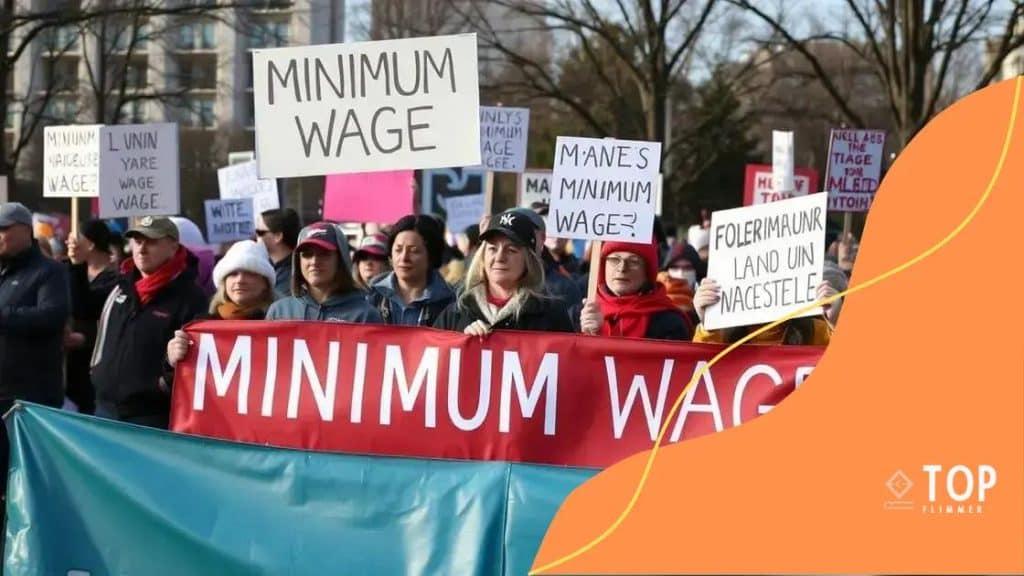National minimum wage hike protests ignite public debate

The national minimum wage hike protests aim to secure fair compensation for workers, highlighting the impact of wage policies across various sectors and emphasizing the need for economic justice.
National minimum wage hike protests are reshaping conversations about fair compensation. Have you ever wondered how these movements affect our daily lives and the economy? Let’s dive into the details.
Understanding the national minimum wage
Understanding the national minimum wage is crucial for everyone in today’s economy. It plays a significant role in shaping financial stability for many workers. This wage is the lowest legal hourly pay that employers can offer. In essence, it aims to protect workers from unfair compensation.
The national minimum wage has evolved over time, reflecting changes in the cost of living and economic conditions. Knowing the history helps us see why wage hikes are so important. It not only affects individual lives but also the broader economy.
Historical Overview
Looking back, the minimum wage was first introduced in the United States during the Great Depression. This was a key step towards ensuring fair compensation. As society has progressed, so have the arguments surrounding wage increases.
Current Minimum Wage Rates
Today, the federal minimum wage is set at a specific rate, yet many states have opted for higher rates. It’s important to discuss how these rates differ:
- Federal: $7.25 per hour
- California: $15.00 per hour
- New York: $15.00 per hour
- Florida: $11.00 per hour
As you can see, there are significant variations depending on the state. These differences reflect local living costs and economic conditions. Therefore, understanding these rates can influence how workers advocate for fair pay.
Moreover, the discussions around raising the minimum wage are gaining momentum. Advocates argue that increasing it ensures that workers earn a livable income. This is essential for meeting basic needs like housing, food, and healthcare. In contrast, critics often express concerns about potential job losses and increased business costs.
Benefits of Understanding the Wage
Being informed about the national minimum wage can empower both workers and employers. Here are a few benefits:
- Strengthened negotiating power for workers.
- Better compliance with regulations for employers.
- Increased awareness of economic inequalities.
- Encouragement for informed voting on wage policies.
Ultimately, having a clear grasp of the minimum wage is vital. It helps us understand its impact on society and the economy. By staying informed, we can support fair labor practices and advocate for necessary changes.
Historical context of wage hikes
The historical context of wage hikes provides valuable insight into why these changes matter today. Understanding the background helps us appreciate how far we’ve come in the fight for fair pay. Wage increases often stem from economic shifts, labor movements, and societal needs.
Initially, wage hikes emerged in response to poor working conditions during the Industrial Revolution. Workers united to demand better pay and conditions. This solidarity led to significant changes in labor laws over the years. It’s essential to recognize this history, as it shapes current movements.
Key Milestones in Wage Law Changes
Throughout the 20th century, various laws were passed that directly influenced wage hikes. These include:
- 1938: The Fair Labor Standards Act established a federal minimum wage.
- 1966: The first major wage hike increased the minimum wage significantly.
- 1990s: Regular adjustments were made to keep up with inflation.
- 2007: A notable increase in the federal minimum wage to $7.25.
These milestones highlight the ongoing struggle for fair wages in society. Each adjustment reflects the growing recognition of the need for workers to earn a living wage.
Over time, the discussions surrounding wage hikes have also evolved. Activists continue to advocate for increases, arguing that the cost of living has changed dramatically. Critics of wage hikes express concerns about business impacts and inflation. Both sides present valid points, making the conversation complex.
Impact of Wage Hikes on Society
Understanding the impact of wage hikes is crucial. They can lead to immediate benefits for workers, allowing them to meet basic needs. When workers earn more, they can spend more in their communities, which boosts local economies.
Moreover, higher wages often contribute to lower employee turnover rates. This stability benefits employers through reduced hiring costs. Therefore, examining the historical trends and impacts of wage hikes shows they are not just about dollars but also about improving lives.
Key arguments for and against

The debate over the national minimum wage hike brings forth various arguments for and against it. Understanding both sides is essential for forming an informed opinion on this topic. Advocates argue that raising the minimum wage is vital for ensuring a living wage for workers, while opponents raise concerns about potential negative outcomes on the economy.
Arguments for Raising the Minimum Wage
Supporters of increasing the minimum wage often highlight several benefits:
- Poverty Reduction: Higher wages can lift workers out of poverty, helping them meet basic needs like food, healthcare, and housing.
- Boosting Consumer Spending: When people earn more, they tend to spend more. This can stimulate local economies, benefitting businesses.
- Reducing Turnover Rates: Employees who earn a fair wage are likely to feel more valued and less inclined to leave their jobs, resulting in reduced hiring costs for businesses.
- Improved Worker Morale: Fair pay can enhance job satisfaction and productivity among workers.
These arguments present a strong case for raising the minimum wage. Advocates argue that it can enact significant positive change in society.
Arguments Against Raising the Minimum Wage
On the opposite side, critics express caution and provide essential insights:
- Job Losses: Some economists argue that raising the minimum wage could lead to layoffs or businesses reducing their workforce.
- Increased Prices: Businesses may pass on the costs of higher wages to consumers through price increases, impacting affordability.
- Impact on Small Businesses: Smaller businesses may struggle more than larger corporations to absorb the costs, leading to potential closures.
- Inflation Concerns: Detractors worry that wage increases might lead to inflation, negating the benefits of higher wages.
These concerns reflect the complexity of the wage discussion. Each argument presents valid points and consequences that need careful consideration.
Ultimately, understanding these key arguments for and against a minimum wage hike allows individuals and policymakers to engage in meaningful dialogue. A thorough examination of both sides can inform better decisions regarding wage policies and their broader economic impacts.
Impact on different sectors
The impact of minimum wage hikes varies significantly across different sectors of the economy. Understanding these differences can help us grasp how wage increases influence various industries and the workforce as a whole.
Some sectors may benefit more from wage increases, while others may face challenges. For instance, industries that rely heavily on low-wage labor often see a direct effect on their operational costs. This can lead to both positive and negative outcomes.
Positive Impacts on Sectors
When minimum wages are increased, certain sectors often experience notable benefits:
- Retail: Higher wages can lead to increased employee morale and productivity. Content workers provide better customer service, enhancing the shopping experience.
- Hospitality: In the food and service industry, fair wages help reduce employee turnover. This stability benefits businesses by retaining experienced staff.
- Healthcare: Better pay for healthcare workers helps attract qualified professionals. This results in improved patient care and overall service quality.
These advantages demonstrate how higher wages can create positive outcomes for both workers and businesses in these sectors.
Negative Impacts on Sectors
Conversely, some sectors could struggle in the face of wage increases:
- Small Businesses: Many small businesses operate on thin margins. An increase in minimum wage could lead to difficult decisions, such as cutting staff or reducing hours.
- Manufacturing: This sector may see higher costs, potentially resulting in job cuts or automation to maintain profitability.
- Non-Profit Organizations: Many non-profits rely on fixed budgets. Higher wages can strain resources, impacting their ability to serve communities.
These challenges highlight the complexity of implementing wage hikes across different sectors. Each industry has its unique economic pressures that influence how wage changes affect operations.
Furthermore, the overall impact on the economy also depends on how sectors adapt to these changes. For instance, industries that embrace innovation may find ways to offset increased labor costs through enhancements in efficiency. Overall, the effects of minimum wage hikes are nuanced, reflecting a diverse economy.
Future outlook on wage policies
The future outlook on wage policies is a topic of great significance as society continues to grapple with economic inequality. Many experts believe that we will see ongoing discussions and potential changes in wage laws in the coming years. Factors such as inflation, the cost of living, and emerging job markets all play essential roles in shaping these policies.
As economies recover from global disruptions, there is a growing demand for fair compensation. Many workers are advocating for higher wages to better reflect their contributions and the rising living expenses. This trend highlights an ongoing shift in societal values toward prioritizing economic justice.
Potential Changes in Legislation
In response to public demand, we might witness significant legislative changes regarding minimum wage:
- Increased Federal Minimum Wage: Several lawmakers are advocating for a new federal minimum wage. This could align wages with living costs across different regions.
- Regional Wage Adjustments: Future policies may allow states to set wages based on local economic conditions, recognizing that living expenses vary widely.
- Indexing Minimum Wage: Some proposals include tying the minimum wage to inflation, ensuring it automatically adjusts as the cost of living increases.
These legislative changes could create a more equitable work environment, but they also present challenges that need consideration.
Business Adaptations
As wage policies evolve, businesses will need to adapt. Some companies may seek innovative ways to manage higher labor costs without sacrificing employee welfare:
- Increasing Automation: Businesses may invest in automation to offset labor costs, allowing them to maintain productivity.
- Offering Flexible Pay Structures: Companies might explore alternative pay models, such as profit-sharing or performance-based bonuses, to enhance worker compensation.
- Investing in Employee Training: Upskilling employees can lead to higher productivity rates, helping businesses justify wage increases.
These adaptations provide insights into how businesses can thrive while facing changing wage dynamics. The future of wage policies looks to balance the needs of workers with the realities of maintaining profitable operations in various industries.
As societal awareness grows regarding the importance of fair pay, it will likely push wage policies into the foreground of political and economic discussions. The outcome of these conversations will shape the landscape of labor and the economy for years to come.
FAQ – Frequently Asked Questions about National Minimum Wage Hike Protests
What is the national minimum wage?
The national minimum wage is the lowest legal hourly pay that workers can receive. It ensures that employees earn at least a basic amount to support themselves.
Why are minimum wage hikes important?
Minimum wage hikes are important because they help lift workers out of poverty, improve living standards, and boost local economies through increased spending.
How do wage increases impact small businesses?
Wage increases can impact small businesses by raising labor costs, which may lead to difficult decisions like cutting hours, reducing staff, or increasing prices.
What arguments exist against raising the minimum wage?
Arguments against raising the minimum wage often include concerns about potential job losses, increased prices for consumers, and added strain on small businesses.






